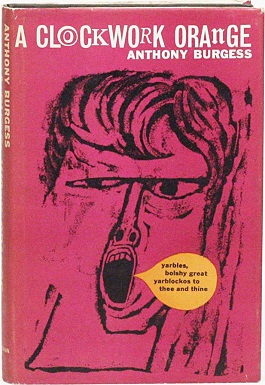
A Clockwork Orange is a dystopian satirical black comedy novella by English writer Anthony Burgess, published in 1962. It is set in a near-future society that has a youth subculture of extreme violence. The teenage protagonist, Alex, narrates his violent exploits and his experiences with state authorities intent on reforming him. The book is partially written in a Russian-influenced argot called "Nadsat", which takes its name from the Russian suffix that is equivalent to '-teen' in English. According to Burgess, the novel was a jeu d'esprit written in just three weeks.

McCabe & Mrs. Miller is a 1971 American revisionist Western film directed by Robert Altman and starring Warren Beatty and Julie Christie. The screenplay by Altman and Brian McKay is based on the 1959 novel McCabe by Edmund Naughton. Altman referred to it as an "anti-Western" film because it ignores or subverts a number of Western conventions. It was filmed in British Columbia, Canada in the fall and winter of 1970, and premiered on June 24, 1971.

Pauline Kael was an American film critic who wrote for The New Yorker from 1968 to 1991. Known for her "witty, biting, highly opinionated and sharply focused" reviews, Kael often defied the consensus of her contemporaries.

The New Hollywood, Hollywood Renaissance, American New Wave, or New American Cinema, was a movement in American film history from the mid-1960s to the early 1980s, when a new generation of filmmakers came to prominence. They influenced the types of film produced, their production and marketing, and the way major studios approached filmmaking. In New Hollywood films, the film director, rather than the studio, took on a key authorial role.

A Clockwork Orange is a 1971 dystopian crime film adapted, produced, and directed by Stanley Kubrick, based on Anthony Burgess's 1962 novel. It employs disturbing and violent themes to comment on psychiatry, juvenile delinquency, youth gangs, and other social, political, and economic subjects in a dystopian near-future Britain.
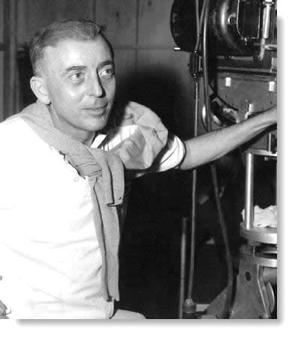
Charles Davies Lederer was an American screenwriter and film director. He was born into a theatrical family in New York, and after his parents divorced, was raised in California by his aunt, Marion Davies, actress and mistress to newspaper publisher William Randolph Hearst. A child prodigy, he entered the University of California, Berkeley at age 13, but dropped out after a few years to work as a journalist with Hearst's newspapers.
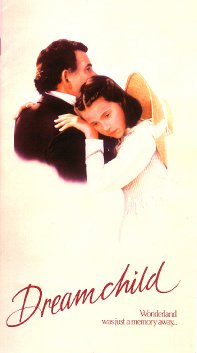
Dreamchild is a 1985 British drama film written by Dennis Potter, directed by Gavin Millar, and produced by Rick McCallum and Kenith Trodd. The film, starring Coral Browne, Ian Holm, Peter Gallagher, Nicola Cowper and Amelia Shankley, is a fictionalised account of Alice Liddell, the child who inspired Lewis Carroll's 1865 novel Alice's Adventures in Wonderland.
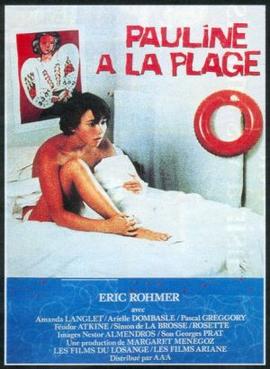
Pauline at the Beach is a 1983 French romantic comedy film directed by Éric Rohmer. The film stars Amanda Langlet, Arielle Dombasle, Pascal Greggory and Féodor Atkine. It is the third in the 1980s series "Comedies and Proverbs" by Rohmer.

I Lost It at the Movies is a 1965 compendium of movie reviews written by Pauline Kael, later a film critic from The New Yorker, from 1954 to 1965. The book was published prior to Kael's long stint at The New Yorker; as a result, the pieces in the book are culled from radio broadcasts that she did while she was at KPFA, as well as numerous periodicals, including Moviegoer, the Massachusetts Review, Sight and Sound, Film Culture, Film Quarterly and Partisan Review. It contains her negative review of the then-widely acclaimed West Side Story, glowing reviews of other movies such as The Golden Coach and Seven Samurai, and longer polemical essays such as her largely negative critical responses to Siegfried Kracauer's Theory of Film and Andrew Sarris's Film Culture essay "Notes on the Auteur Theory, 1962". The book was a bestseller upon its first release and is now published by Marion Boyars Publishers.

Kiss Kiss Bang Bang (1968) is Pauline Kael's second collection of reviews from 1965 through 1968, compiled from numerous magazines including The Atlantic, Holiday, The New Yorker, Life, Mademoiselle, The New Republic, McCall's, and Vogue. It features her review of The Sound of Music, which she notoriously dubbed "The Sound of Money," sparking outrage from loyal readers of McCall's. This is erroneously considered to be the reason why she was fired from her short-lived position as their film critic. The book also features a smaller collection of synopses of little-known movies, some of which are also printed in Kael's 5001 Nights at the Movies.

State of the Art: Film Writings 1983–1985 is the eighth collection of movie reviews by the American critic Pauline Kael.

Reeling is Pauline Kael's fifth collection of movie reviews, covering the years 1972 through 1975. First published in 1976 by Little Brown, the book is largely composed of movie reviews, ranging from her famous review of Last Tango in Paris to her review of A Woman Under the Influence, but it also contains a longer essay entitled "On the Future of Movies" as well as a book review of The Fred Astaire & Ginger Rogers Book, by fellow The New Yorker dance critic Arlene Croce. In 2010, four film critics polled by the British Film Institute listed Reeling among their favorite books related to cinema.
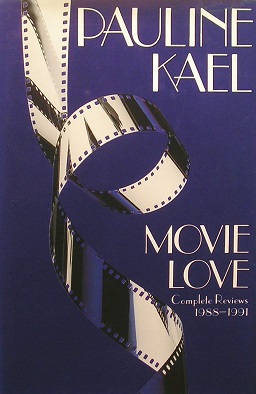
Movie Love: Complete Reviews 1988–1991 (1991) is the 11th and last collection of film reviews by the critic Pauline Kael and covers the period from October 1988 to March 1991, when she chose to retire from her regular film reviewing duties at The New Yorker. In the "Author's Note" that begins the anthology, Kael writes that this period had "not been a time of great moviemaking fervor", but "what has been sustaining is that there is so much to love in movies besides great moviemaking."

Hooked: Film Writings, 1985–88 (1989) is the ninth collection of movie reviews by the critic Pauline Kael, covering the period from July 1985 to June 1988. All articles in the book originally appeared in The New Yorker.

Taking It All In is the seventh collection of movie reviews by the critic Pauline Kael and contains the 150 film reviews she wrote for The New Yorker between June 9, 1980, and June 13, 1983. She writes in the Author's Note at the beginning of the collection that, "it was a shock to discover how many good ones there were", as well as observing that only a very few of the movies she liked were box office successes - E.T. the Extra-Terrestrial, Tootsie, Star Trek II: The Wrath of Khan. She laments that, "in the '80s, films that aren't immediate box office successes are instantly branded as losers, flops, bombs. Some of the movies that meant the most to me were in this doomed group - The Stunt Man, Pennies from Heaven, Blow Out, The Devil's Playground, Melvin and Howard, Shoot the Moon, Come Back to the Five and Dime, Jimmy Dean, Jimmy Dean."

When the Lights Go Down: Film Writings 1975–1980 (1980), is the sixth collection of movie reviews by the critic Pauline Kael.

Going Steady: Film Writings 1968–1969 is the third collection of film reviews by the critic Pauline Kael, comprising the years 1968–1969, when she first began her film-reviewing duties at The New Yorker and which covers, " a crucial period of social and aesthetic change at the end of the sixties."

Mrs. Soffel is a 1984 American drama film directed by Gillian Armstrong, starring Diane Keaton and Mel Gibson and based on the story of condemned brothers Jack and Ed Biddle, who escaped prison with the aid of Kate Soffel, the warden's wife.

"Raising Kane" is a 1971 book-length essay by American film critic Pauline Kael, in which she revived controversy over the authorship of the screenplay for the 1941 film Citizen Kane. Kael celebrated screenwriter Herman J. Mankiewicz, first-credited co-author of the screenplay, and questioned the contributions of Orson Welles, who co-wrote, produced and directed the film, and performed the lead role. The 50,000-word essay was written for The Citizen Kane Book (1971), as an extended introduction to the shooting script by Mankiewicz and Welles. It first appeared in February 1971 in two consecutive issues of The New Yorker magazine. In the ensuing controversy, Welles was defended by colleagues, critics, biographers and scholars, but his reputation was damaged by its charges. The essay and Kael's assertions were later questioned after Welles's contributions to the screenplay were documented.

Edmund Naughton (1926–2013) was an American writer and journalist whose first novel, McCabe (1959), was the basis for the 1971 film McCabe & Mrs. Miller. The film, directed by Robert Altman, is now considered a masterpiece. After 1958, Naughton lived in France and England. Between 1959 and 1984, Naughton published six novels in the genres of westerns and crime fiction. The first two were published in French translation as well as English; the last two were published only in translation.




















